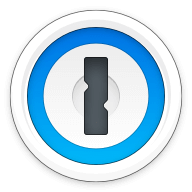Our bottom line: Bitwarden has the edge on price, platform compatibility, and form filling, but NordPass performs better on 2FA.
NordPass vs. Bitwarden Overview
NordPass and Bitwarden are among the best password managers available today. These services offer similar user experience (UX) and security options, although each has unique features that may appeal to different people.
Bitwarden has lower price points, but both platforms offer robust free versions for individual users. By working with nearly every platform and in over 50 languages, Bitwarden also stands out by offering a wide range of platform compatibility. Also, form filling is important to you in a password manager, you’ll appreciate its features more than NordPass’s. However, if you value 2FA, you may prefer NordPass.
Which password manager should you get? Let this NordPass vs. Bitwarden face-off help you decide.
| Review factor | Winner |
|---|---|
| Price | Bitwarden (5.0) |
| Platform compatibility | Bitwarden (5.0) |
| User experience (UX) | Tie: NordPass (5.0), Bitwarden (5.0) |
| Form filling | Bitwarden (4.5) |
| Security | Tie: NordPass (5.0), Bitwarden (5.0) |
| Two-factor authentication (2FA) | NordPass (5.0) |
| Best overall | Bitwarden (4.8) |
NordPass vs. Bitwarden: Specs
| Password manager | Details | Basic plan features |
|---|---|---|
| NordPass Overall rating: (4.3) Read our full NordPass review. | Starting price: Free Platform compatibility: Android, iOS, Linux, Mac, Web (Brave, Chrome, Edge, Firefox, Safari, Opera, Vivaldi), Windows Security: XChaCha20, 2FA |
|
| Bitwarden Overall rating: (4.8) Read our full Bitwarden review. | Starting price: Free Platform compatibility: Windows, MacOS, Linux, Android, iOS, Web (Chrome, Firefox, Safari, Edge, Opera, Vivaldi, Brave, Tor) Security: AES 256-bit encryption, 2FA |
|
NordPass vs. Bitwarden: Plans and Pricing
Price winner: Bitwarden | |
|---|---|
| Bitwarden (5.0) | Free individual plans; $10 per year for premium; $40 per year for up to six users; $3 to $5 per user for business plans |
| NordPass (4.0) | Free individual plans; $25.35 per year for premium, billed monthly; $44.85 per year for up to six people, billed monthly |
While both NordPass and Bitwarden are strong contenders for the best free password manager, Bitwarden’s paid plans offer more bang for your buck. At only $10 per year — less than $1 per month — you get all of the same features as NordPass (except for SSO capabilities, which are only available to enterprise-level plan holders).
However, the $10 per month plan only allows for one user, but you can expand to a six-user plan for only $40 ($3.33 per month) if you need to.
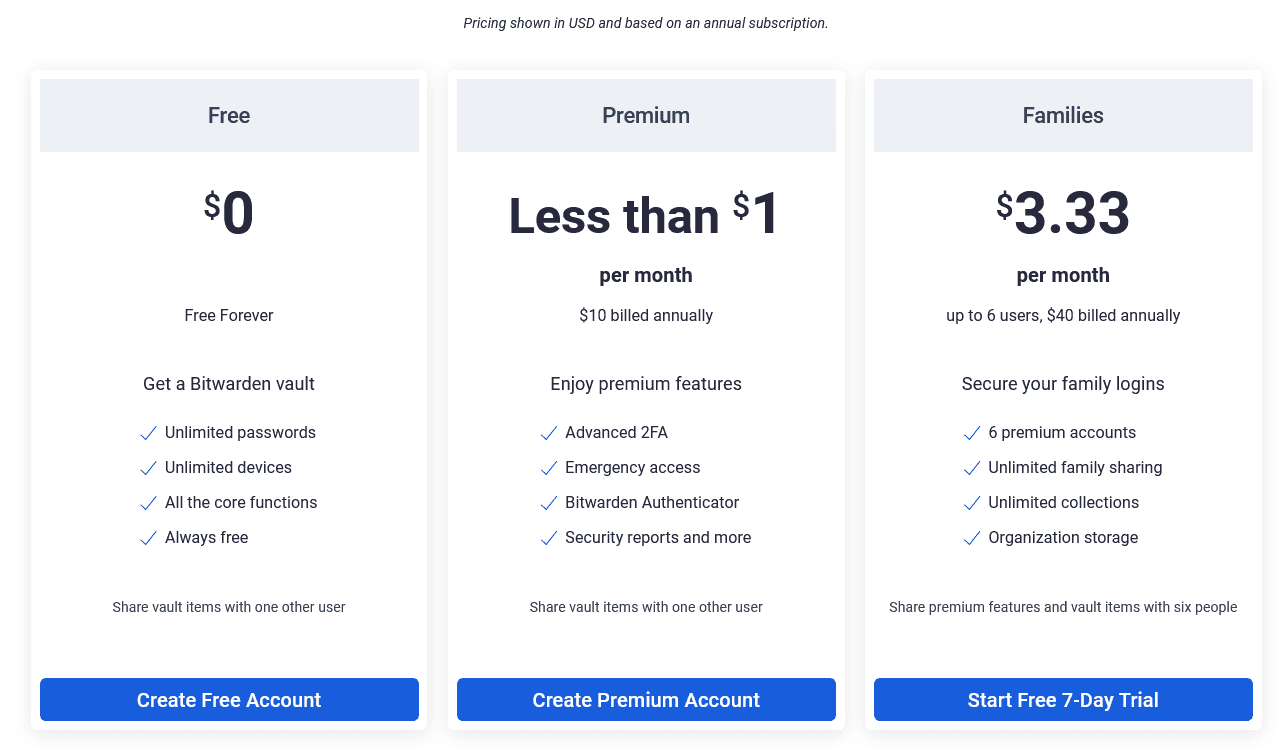
That said, NordPass’s free tier is a decent alternative. Unlike Bitwarden, you get all the capabilities of the paid plans, including SSO capabilities, plus 2 GB more storage than Bitwarden provides. So if you’re a single user, NordPass may be a better option in terms of price. But once you look at paid plans, I still think Bitwarden is the better deal.
Winner: Bitwarden wins plans and pricing because it offers more economical paid options.
NordPass vs. Bitwarden: Platform Compatibility
Platform compatibility winner: Bitwarden | |
|---|---|
| Bitwarden (5.0) | OS: Windows, MacOS, Linux, Android, iOS, webOS Supported browsers: Chrome, Firefox, Safari, Edge, Opera, Vivaldi, Brave, Tor |
| NordPass (4.3) | OS: Android, iOS, Linux, Mac, Web, Windows Supported browsers: Brave, Chrome, Edge, Firefox, Opera, Safari, Vivaldi |
Bitwarden gets the edge of platform compatibility because it works with nearly every platform. Many password managers offer limited compatibility, especially on free tiers, which is the case with NordPass.
Meanwhile, Bitwarden is compatible almost across the board and can be used in over 50 languages, making it one of the most accessible password managers available today.
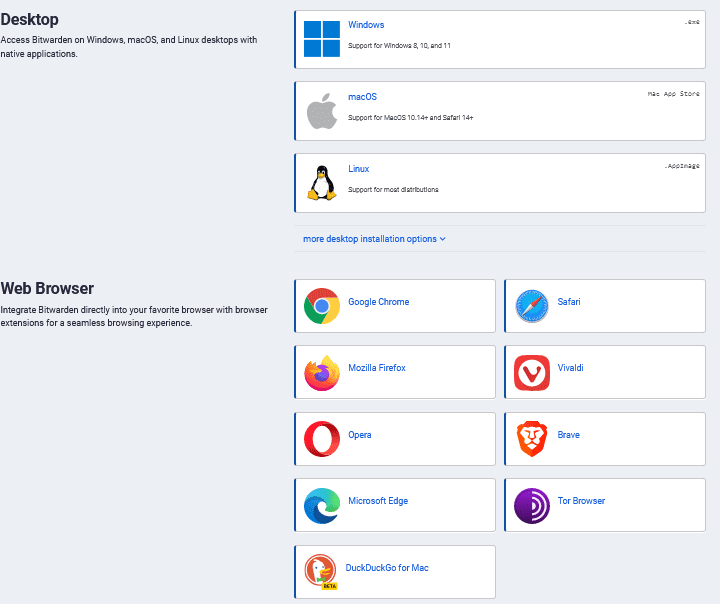
I docked points for NordPass’s compatibility largely because of how limited its availability is with iOS. As an iOS user myself, I found this incredibly inconvenient. It became even more apparent when using the iOS mobile app, which didn’t support password generation or auto-save for new passwords. Instead, you had to manually input new passwords on your mobile device.
Winner: Bitwarden wins platform compatibility because of its accessibility across nearly every platform and over 50 languages.
NordPass vs. Bitwarden: UX
UX winner: Draw | |
|---|---|
| Bitwarden (5.0) | Clean, user-friendly interface across desktop, browser, and mobile |
| NordPass (5.0) | Nicely modern and minimalistic |
Both NordPass and Bitwarden shine in UX implementation. Each provides streamlined interfaces that make for user-friendly applications. I found Bitwarden to be one of the easiest password managers to navigate. Adding and editing vault items was a breeze, especially in the browser extension.
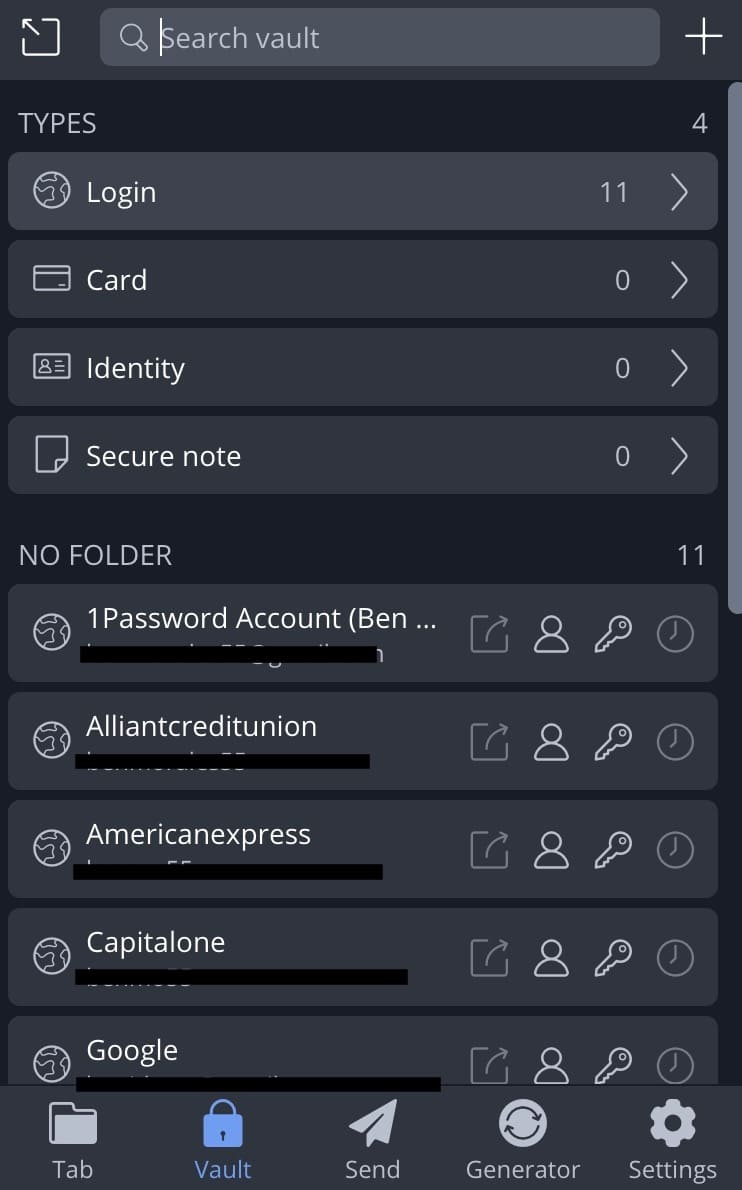
NordPass’s modern, minimalistic interface made it both easy to navigate and visually appealing. The MacOS app had a section for each category of information — passwords, credit cards, secure notes, and personal data — which made it easy to stay organized and find what I was after. Shared items also have a dedicated section to help you keep them separate from your private data.
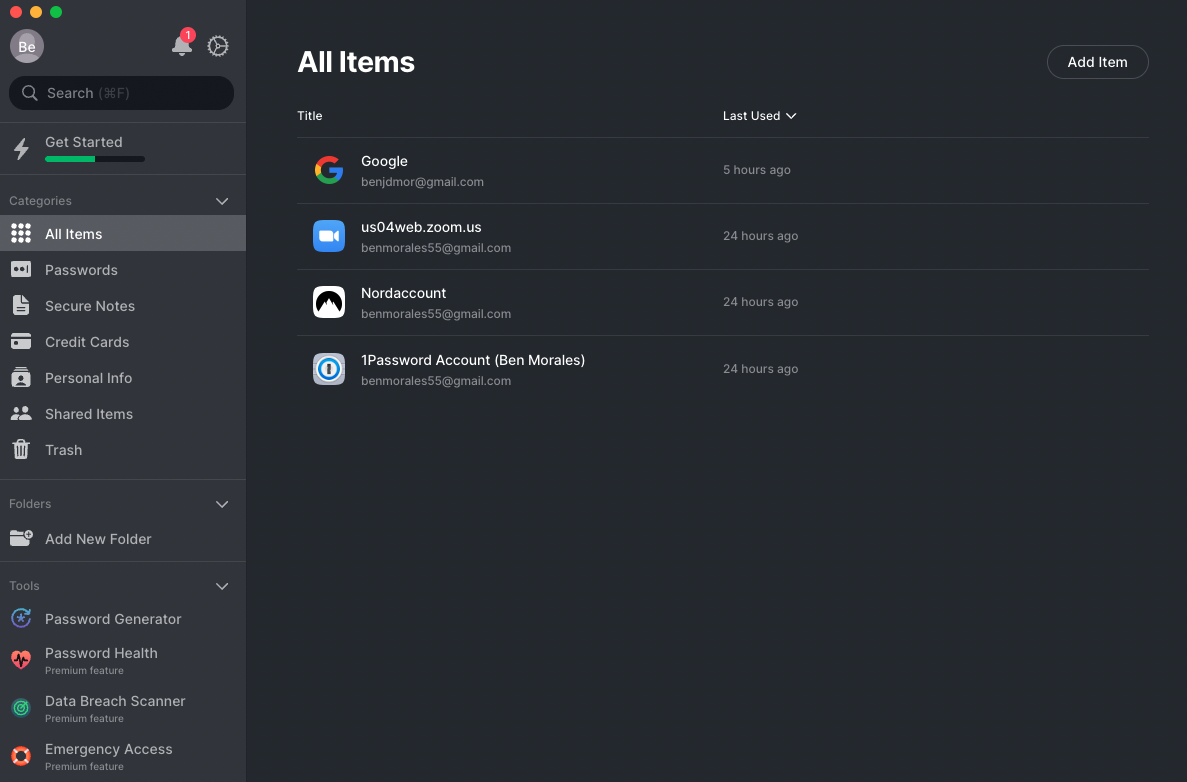
NordPass’s browser extension is also intuitive with easy-to-access autofill capability. Given the importance of a password manager’s browser extension, this was a key factor in giving it full stars for UX.
NordPass vs. Bitwarden: Form Filling
Form filling winner: Bitwarden | |
|---|---|
| Bitwarden (4.5) | Top-tier form filling for login and credit card information; won’t prepopulate addresses |
| NordPass (3.0) | Routinely filled fields incorrectly; doesn’t recognize billing address field |
Bitwarden is the clear winner and remains one of the best form-filling platforms I’ve tested, despite a few shortcomings.
While both login and credit card information auto-filled flawlessly, I was a bit disappointed that it doesn’t autofill addresses. You can store addresses in the vault, but they won’t prepopulate on forms. Given how much online shopping is done today, this is pretty disappointing.
The other shortcoming I encountered was that you could only trigger the autofill capabilities through a browser extension. This is far less convenient than the icons that appear next to unfilled fields for other premium password managers I’ve tested.
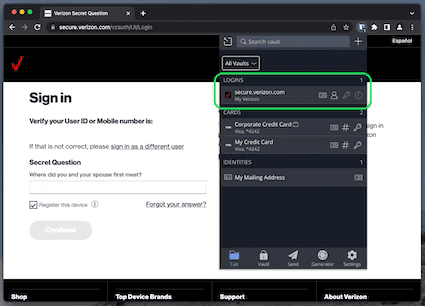
NordPass’s auto-fill feature appears promising initially, but after several failed attempts at filling in my information, I concluded this password manager is not up to the task. It could not consistently recognize billing address fields and incorrectly populated at least one field every time I tested it.
Winner: Bitwarden wins form filling because of its reliability and ease of use, despite minor shortcomings.
NordPass vs. Bitwarden: Security
Security winner: Draw | |
|---|---|
| Bitwarden (5.0) |
|
| NordPass (5.0) |
|
Most password managers, including Bitwarden, use powerful 256-bit AES encryption, the industry standard which is widely accepted as unbreachable. However, NordPass uses XChaCha20 encryption, which surpasses even 256-bit AES.
NordPass also operates out of Panama, so it is outside the reach of the Five Eyes Intelligence Oversight and Review Council (FIORC). This means it can never be legally obligated to share its data. You also get real-time notifications of breaches on other websites that may have exposed your data.
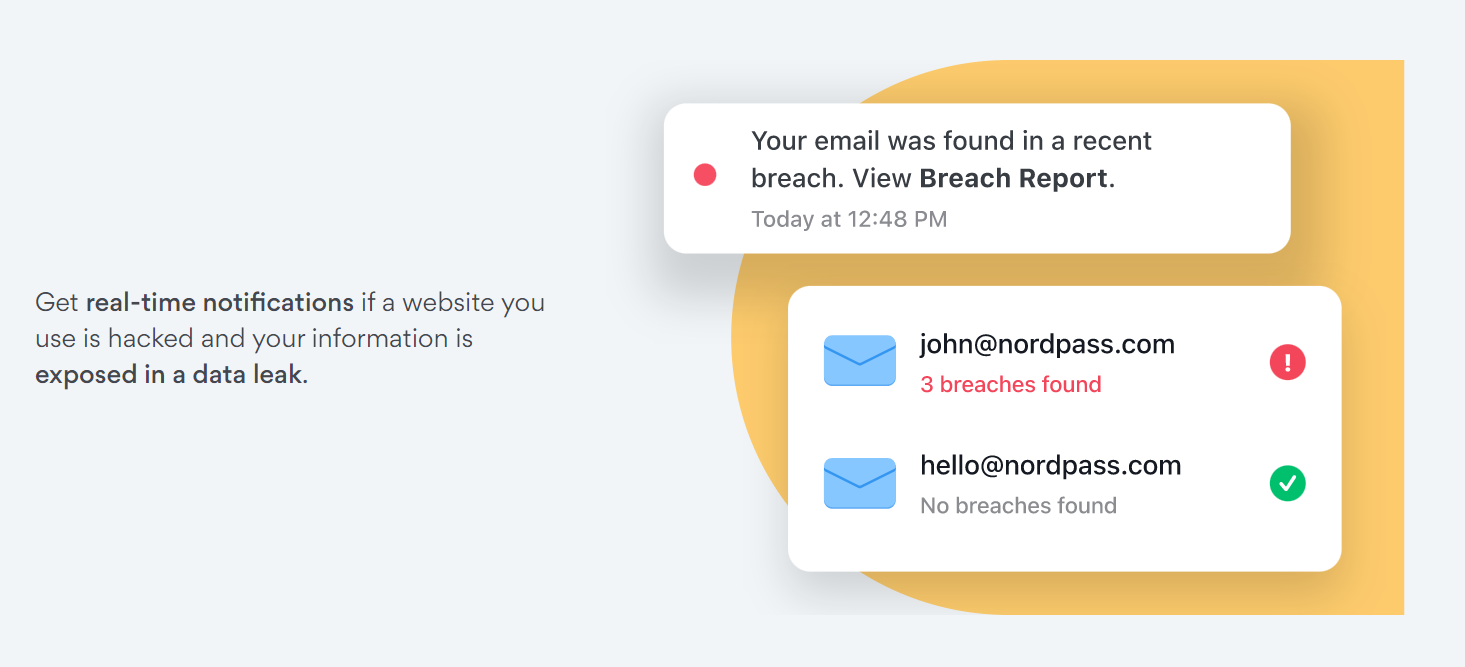
Both NordPass and Bitwarden have zero-knowledge architecture to ensure users are the only ones with access to their data. Bitwarden also uses security code transparency so every line of code can be inspected. All of its source code is hosted on GitHub, where anyone can review it for free. It’s audited by third-party security firms.
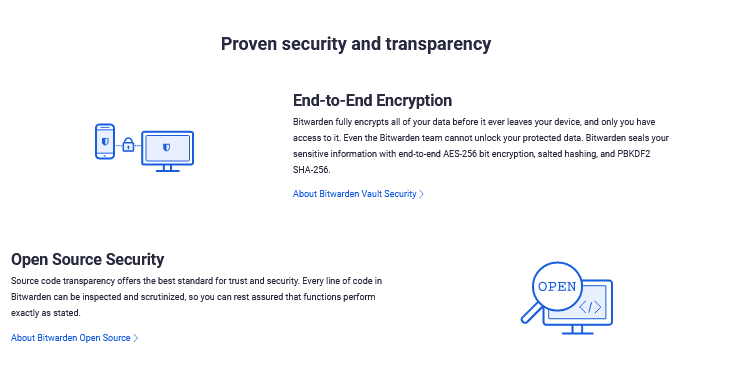
What I would like to see more of from Bitwarden is dark web monitoring and VPN. While Bitwarden reports leaks, its service is more limited than NordPass’s. So if monitoring is important to you, I’d lean toward NordPass.
NordPass vs. Bitwarden: 2FA
2FA winner: NordPass | |
|---|---|
| NordPass (5.0) |
|
| Bitwarden (4.7) |
|
NordPass excels at reliable, easy-to-use 2FA. Setting up 2FA was quick, and after enabling it on the MacOS app, I chose my preferred option. I opted for scanning a QR code — it doesn’t get much easier.
That said, I would like to see more options from NordPass to take it from great to top-of-the-line. Features such as biometric logins, SMS codes, and smartwatch compatibility would make it more competitive and appealing.

Bitwarden’s 2FA also has a lot going for it. I liked using YubiKey and FIDO, two of the most secure 2FA options unavailable on many password managers. However, for most people, these features will be superfluous.
What made me dock points on Bitwarden’s 2FA is its lack of biometric authentication and that YubiKey and FIDO are only available to premium users.
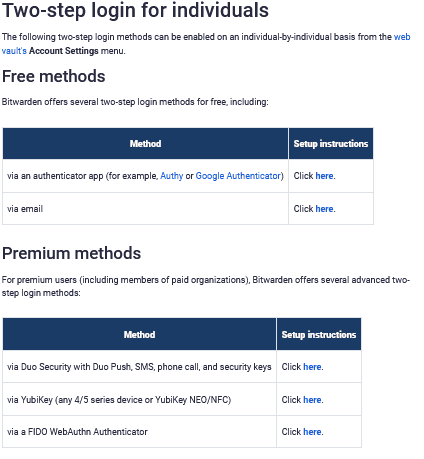
Winner: NordPass wins 2FA because of how easy it is to set up and its reliability when used.
Should You Get NordPass or Bitwarden?
Bottom line winner: Bitwarden | |
|---|---|
| Bitwarden (4.8) |
Best for: Personal users who want a free password manager that doesn’t sacrifice performance |
| NordPass (4.3) |
Best for: People who need to secure a high volume of passwords on a single device for no cost |
NordPass and Bitwarden have a lot going for them, but Bitwarden pulls ahead in terms of price, platform compatibility, and form filling. Both platforms offer decent free versions. However, Bitwarden’s paid plans cost less for almost the same features, making it a better choice for those looking for the best cheap password manager.
Bitwarden is also one of the most accessible password managers I’ve reviewed. It’s compatible with nearly every platform and can be used in over 50 languages. Meanwhile, NordPass has limited compatibility, which is particularly frustrating if you’re a Mac user.
NordPass’s form filling also fell woefully short as it repeatedly populated fields incorrectly or didn’t recognize they needed to be filled in. But NordPass does outshine Bitwarden in terms of 2FA, largely because it is everything the form-filling feature is not: easy to set up and reliable.
Both platforms offer some of the best UX and security on the market. Bitwarden and NordPass have opted for more minimalist designs, which I found appealing. It helped me find what I was after and keep everything organized.
In terms of security, while both earned full marks for robust security, I like that NordPass takes things one step above AES 256-bit encryption by using XChaCha20. It also offers better breach monitoring than Bitwarden.
How I Evaluated NordPass vs. Bitwarden
On the surface, all password managers essentially generate and store passwords. As I evaluated providers, I dug deeper, comparing software on what matters most, including price, platform compatibility, security, and other factors.
I signed up for a plan with each provider to test:
- Plan value: Most password managers offer various subscription plans from free to around $20 per month. While free plans may be sufficient for some, those that need more functionality may prefer paid plans. We included a wide array of free and paid password managers to find the one that works best for you.
- Platform compatibility: You likely access your online accounts from multiple devices, including desktops, laptops, tablets, phones, as well as through different web browsers. Your password manager should be compatible with various devices, operating systems and browsers, and sync seamlessly between them all.
- UX: This is how you interface with all the features and functions of your new password manager — if it’s bad, you’ll be less likely to use the service. While this is a highly subjective category and some will disagree, it’s important to provide an overview based on my experience.
- Form filling: A password manager doesn’t have to include form-filling, but it’s somewhat standard and the ease with which it performs that function can be the deciding factor in which password manager you ultimately choose.
- Security: Since a password manager is first and foremost a security tool, it should come with all of the most up-to-date standard security features. This includes the highest level of available encryption (256-bit AES with PBKDF2-HMAC-SHA512); 2FA, such as biometric logins or MFA, and a password generator.
- Two-factor authentication (2FA): Used all over the internet to protect your accounts, this is quickly becoming a standard security practice. 2FA is a great way to secure more sensitive accounts to ensure they’re not breached.
Learn more about our review methodology.

About the Password Manager, Gunnar Kallstrom:
Kallstrom is a Cyber Team Lead for a Department of Defense (DOD) contracting company in Huntsville, Alabama, and has also worked as a computer network defense (CND) Cyber Analyst. An author and content creator for a cybersecurity academy, Kallstrom spent nearly 15 years in the Army as a musician before entering the cybersecurity field.
He holds a bachelor’s degree in music from Thomas Edison State University and a master’s in organizational development and leadership from the University of the Incarnate Word.
Kallstrom has completed several Computing Technology Industry Association (CompTIA) courses, including Security+, Network+, A+ Core 1, and A+ Core 2. He earned a CompTIA Security+ Certification. Additionally, he has completed the Cyber Warrior Academy program with more than 800 hours of hands-on, intensive, and lab-driven technical training in cybersecurity methods and procedures.
Passionate about all things cyber, Kallstrom was a speaker on a panel at the 2022 InfoSec World conference, giving a talk entitled “Hacking into a Cyber Career – True Stories.” Kallstrom is also a mentor to entry-level cybersecurity candidates seeking to break into the field. When he’s not working, he still enjoys playing guitar and fishing (not phishing).

